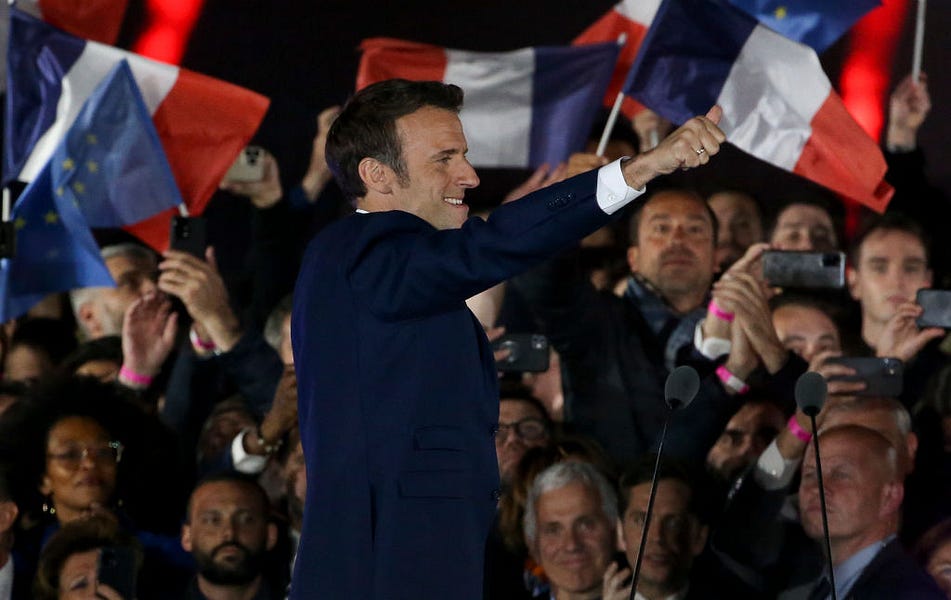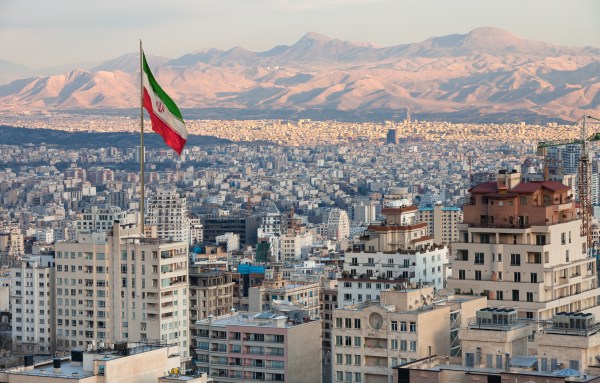Emmanuel Macron’s defeat of Marine Le Pen in France’s presidential election on Sunday was a victory for moderation over extremism. But despite the collective sigh of relief from the EU and many in the West, Macron’s work is just beginning and the road ahead is filled with obstacles.
“Many of our compatriots voted for me not out of support for my ideas but to block those of the extreme right. I want to thank them and I know that I have a duty towards them in the years to come,” Macron said.
Macron’s second-round campaign was carried by moderate left-wing voters, who wanted to prevent a Le Pen presidency. Marine Le Pen is widely seen as stigmatizing immigrants and religious minorities, all while opposing the European Union. Those voters made him one of the few French presidents to win a second term, but his margin of victory—58 percent to 41 percent—was not overwhelming and the abstention rate of 28 percent was the highest since 1969.
Most fascinating are the first numbers about the vote on Sunday, divided by age group and profession. Macron was largely supported by voters ages 18 to 24 and older than 70, while Le Pen carried 50- to 59-year-olds and was head to head with Macron in the 25 to 34 age bracket. Le Pen’s support mainly came from workers and employees in the private sector, while Macron got most of his support from government employees and retired citizens.
Next up: France will hold parliamentary elections in a few weeks, and Macron knows they will be crucial for the way forward. Without a majority in the National Assembly, he will be unable to make any significant changes. In those elections, Macron’s En Marche party faces challenges from all directions. Left-wing voters begrudgingly supported Macron against Le Pen, but they largely supported third-place Jean-Luc Mélenchon in the first round and will seek to translate that into a significant representation in Parliament. The far-left contender has already laid out terms to other left-wing parties in a bid to oust Macron’s centrist majority.
So far, Le Pen’s nationalist “National Rally” party has refused party deals with other far-right groups ahead of the parliamentary vote in June. Far-right candidate Eric Zemmour has called for a “union of the right” with Le Pen, but she likely still holds grudges over Zemmour competing with her for voters in the first round.
And then there is the bigger picture of Europe. France wasn’t the only country to have an election last weekend. In Slovenia, centrist newcomer Robert Golob defeated incumbent Janez Janša handily, another victory for the moderate consensus in Europe. Janša had become known as Slovenia’s up-and-coming populist, a Donald Trump supporter in the heart of the European Council who embarrassed himself after prematurely congratulating Trump for winning the election in 2020.
Macron’s reelection also serves as a stabilizing factor in the European Union— Brussels had looked upon the vote in France with unease, as the war in Ukraine requires unequivocal leadership in the European Union. But even in losing, Le Pen secured the highest number of votes her party has ever gotten so it remains clear that nationalist oppositions are still a threat. Each time Le Pen and her party challenge the moderate establishment in France, they get closer to securing regional and national offices. In 2017, Macron’s lead over Le Pen had been 32 points; now it’s only 17. Whether or not Le Pen—who has not ruled out a fourth campaign for the presidency—runs again is not a logistical problem for her movement: Her niece Marion Maréchal-Le Pen is a popular alternative among their nationalist supporters.
Macron’s reelection in France will also mark a shift in policy in Paris. French presidents are limited to two terms, and with no need to consider his future chances Macron now has leeway to put his foot down on a range of issues. A Macron-aligned member of the European Parliament already indicated that the French will push for increased robotization in agriculture, as well as overturn the consensus on the ban on genetic engineering. Before the election, Emmanuel Macron had recognized that the war in Ukraine meant that Europe cannot afford to pursue an agricultural policy that reduces farm land and cuts down on crop protection. USDA studies had indicated that the EU’s reforms in agriculture would significantly increase food prices, which EU leaders seem less keen on in the current climate. France as a major agricultural hub, however, might put the brakes on the reforms that have been planned by Brussels thus far.
On foreign policy, Macron will try to unite European foreign policy: a necessary component for the creation of a European army, of which he is a strong supporter. That increased centralization and standardization of the EU has its opponents, and France’s nationalists will likely capitalize on rising anti-EU sentiments.
From the perspective of the French moderates, reason has prevailed. Whether or not French citizens will be convinced that being the lesser of two evils is really enough will show itself all along with this five-year term.






Please note that we at The Dispatch hold ourselves, our work, and our commenters to a higher standard than other places on the internet. We welcome comments that foster genuine debate or discussion—including comments critical of us or our work—but responses that include ad hominem attacks on fellow Dispatch members or are intended to stoke fear and anger may be moderated.
With your membership, you only have the ability to comment on The Morning Dispatch articles. Consider upgrading to join the conversation everywhere.